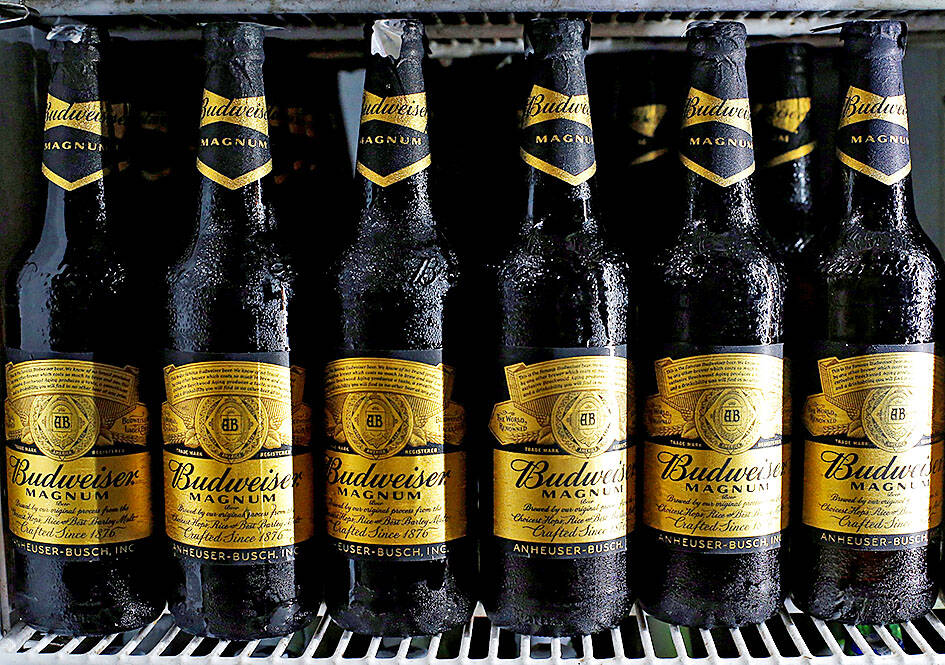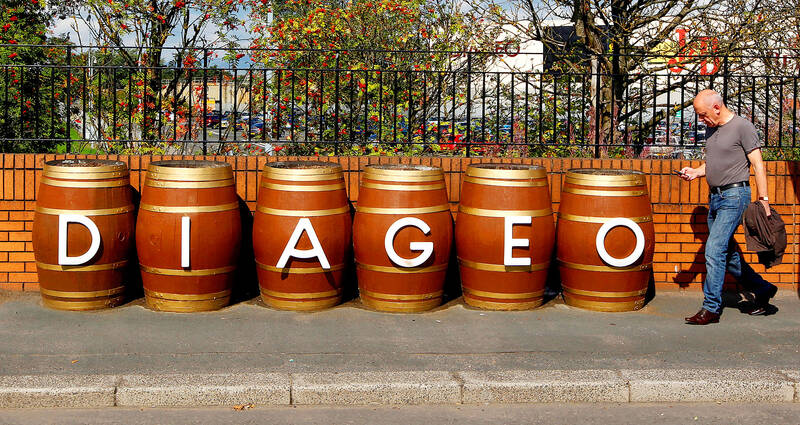India, which bans direct advertising of liquor, is set to announce sweeping rules that will bar even surrogate ads and sponsoring of events, which could force firms such as Carlsberg, Pernod Ricard and Diageo to redraw marketing campaigns.
Such “surrogate ads” often get round the ban by ostensibly showing less desirable items instead, such as water, music CDs or glassware garbed in logos and hues linked to their key product, and often promoted by popular Bollywood film stars.
Now they could bring fines for companies and bans for celebrities endorsing tobacco and liquor ads deemed misleading, according to the top civil servant for consumer affairs and draft rules.

Photo: Reuters
“You can’t take a circuitous way to promote products,” the official, Nidhi Khare, said, adding that final rules were expected to be issued within a month.
“If we find ads to be surrogate and misleading, then even those who are endorsing (products), including celebrities, will be held responsible.”
For example, brewer Carlsberg promotes its Tuborg drinking water in India, with an ad showing film stars at a rooftop dance party and the slogan “Tilt Your World,” which echoes its beer ads elsewhere, emblazoned with the message: “Drink Responsibly.”

Photo: Reuters
Competitor Diageo’s YouTube ad for its Black & White ginger ale, which has drawn 60 million views, features the signature black-and-white terriers from its scotch of the same name.
The changes threaten a sea change for liquor makers in India, the world’s eighth-biggest alcohol market by volume, with annual revenues Euromonitor estimates at $45 billion.
ADVERTISING PROHIBITION
Growing affluence among its 1.4 billion people makes India a lucrative market for the likes of Kingfisher beer maker, United Breweries, part of the Heineken Group, which has more than a quarter of market share by volume.
Popular for their whiskies, Diageo and Pernod, taken together, have a market share of about a fifth, while for Pernod, India contributes about a tenth of global revenues.
The new rules call for “prohibition against engaging in surrogate advertisement,” which extends to sponsorships and ads for products viewed as “brand extensions” that share the characteristics of an alcohol brand, the draft said.
Penalties under the new rules rely on consumer law, opening manufacturers and endorsers to fines of up to 5 million rupees ($60,000), while promoters risk endorsement bans running from one to three years.
Carlsberg declined to comment, while other companies did not respond to queries, including those on sales of non-alcohol products.
Members of the International Spirits and Wines Association of India, which represents Diageo and Pernod, “are committed to a compliant way of building brand extension businesses,” said its outgoing chief executive, Nita Kapoor.
The group was in talks with the government and supported advertising of “genuine” brand extensions, she added.
HEALTH IMPACT
The World Health Organization says bans or comprehensive curbs on alcohol advertising “are cost-effective measures” in the interest of public health.
Its data shows India’s consumption of alcohol per person will rise to nearly 7 liters in 2030, from about 5 liters in 2019, a period over which fellow Asian giant China’s consumption will drop to 5.5 liters.
And alcohol-related deaths in India stood at 38.5 for every 100,000 of its population, versus 16.1 for China.
Khare said India’s draft followed a review of global best practices, in countries such as Norway, which bans ads for alcohol and other goods relying on features of a liquor brand, in curbs that researchers say have cut alcohol sales over time.
The new draft rules prohibit marketing of items such as soda or music CDs employing a “similar label, design, pattern, logo” to that of alcohol products, explicitly targeting efforts to get around current bans.
Ads for items such as glasses and soda cans allow “brand names to appear in all their ads, creating its recall value for the consumers,” however, the draft states.
The new rules follow warnings to some liquor companies, such as Pernod, and some domestic tobacco firms to halt misleading ads, a senior government source said, speaking on condition of anonymity.
India is not against brand extension ads, the official added, but wants them to properly depict the product being showcased, rather than giving consumers the impression that the ad is for a liquor brand.
One India video promoted by Pernod, ostensibly for glassware products linked to its whisky brand, Blenders Pride, shows Bollywood star Alia Bhatt walking a ramp under flashing disco lights, and saying, “My life, my pride.”
While it has a logo similar to that of the whisky brand, the video, which also appears on the website of the Blenders Pride Glassware Fashion Tour, shows no glassware products.

One of the most important gripes that Taiwanese have about the Democratic Progressive Party (DPP) is that it has failed to deliver concretely on higher wages, housing prices and other bread-and-butter issues. The parallel complaint is that the DPP cares only about glamor issues, such as removing markers of Chinese Nationalist Party (KMT) colonialism by renaming them, or what the KMT codes as “de-Sinification.” Once again, as a critical election looms, the DPP is presenting evidence for that charge. The KMT was quick to jump on the recent proposal of the Ministry of the Interior (MOI) to rename roads that symbolize

On the evening of June 1, Control Yuan Secretary-General Lee Chun-yi (李俊俋) apologized and resigned in disgrace. His crime was instructing his driver to use a Control Yuan vehicle to transport his dog to a pet grooming salon. The Control Yuan is the government branch that investigates, audits and impeaches government officials for, among other things, misuse of government funds, so his misuse of a government vehicle was highly inappropriate. If this story were told to anyone living in the golden era of swaggering gangsters, flashy nouveau riche businessmen, and corrupt “black gold” politics of the 1980s and 1990s, they would have laughed.

It was just before 6am on a sunny November morning and I could hardly contain my excitement as I arrived at the wharf where I would catch the boat to one of Penghu’s most difficult-to-access islands, a trip that had been on my list for nearly a decade. Little did I know, my dream would soon be crushed. Unsure about which boat was heading to Huayu (花嶼), I found someone who appeared to be a local and asked if this was the right place to wait. “Oh, the boat to Huayu’s been canceled today,” she told me. I couldn’t believe my ears. Surely,

When Lisa, 20, laces into her ultra-high heels for her shift at a strip club in Ukraine’s Kharkiv, she knows that aside from dancing, she will have to comfort traumatized soldiers. Since Russia’s 2022 invasion, exhausted troops are the main clientele of the Flash Dancers club in the center of the northeastern city, just 20 kilometers from Russian forces. For some customers, it provides an “escape” from the war, said Valerya Zavatska — a 25-year-old law graduate who runs the club with her mother, an ex-dancer. But many are not there just for the show. They “want to talk about what hurts,” she